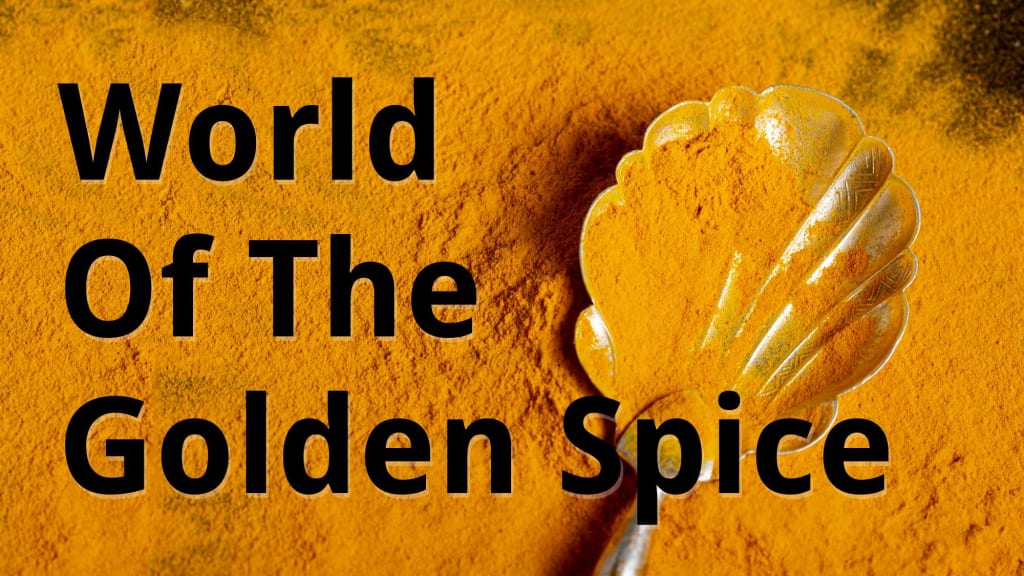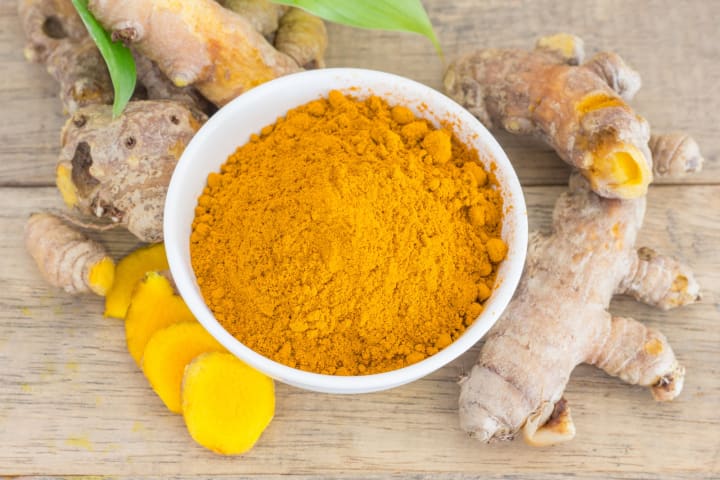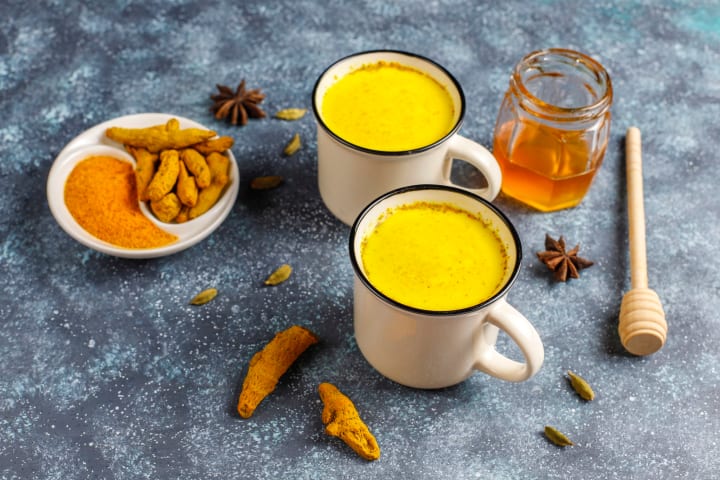The Spice is Right: Turmeric Takes the Gold(en Milk)
A Deep Dive into the History, Benefits, and Risks of the Golden Spice That's Taking the Wellness World by Storm

Turmeric, also known as Curcuma longa, is a spice that is native to Southeast Asia, particularly India. It has a long history of use in traditional medicine and has been used in Indian cuisine for thousands of years. Turmeric is a member of the ginger family and is known for its bright yellow color and distinct flavor. In recent years, turmeric has gained popularity as a superfood and is widely used in dietary supplements, skincare products, and even clothing.
History of Turmeric
Turmeric has a rich history dating back thousands of years. The spice was first cultivated in India, where it was used as a dye, a culinary spice, and a medicinal herb. Turmeric was also used in traditional Ayurvedic medicine to treat a variety of ailments, including digestive issues, skin conditions, and respiratory problems.
Turmeric was traded along the ancient Silk Road and was used in both Chinese and Middle Eastern medicine. In the 13th century, Marco Polo described turmeric as a vegetable with properties similar to saffron. During the colonial era, turmeric was introduced to Europe and quickly gained popularity as a culinary spice.
Today, India is the world's largest producer and exporter of turmeric, with the spice being grown in several states including Andhra Pradesh, Tamil Nadu, and Maharashtra.

Benefits of Turmeric
Turmeric contains several bioactive compounds, the most important of which is curcumin. Curcumin has powerful anti-inflammatory and antioxidant properties and is believed to be responsible for many of turmeric's health benefits.
Here are some of the potential benefits of turmeric:
Anti-inflammatory effects: Chronic inflammation is a major contributor to many chronic diseases, including heart disease, cancer, and Alzheimer's disease. Curcumin has been shown to have powerful anti-inflammatory effects, which may help reduce the risk of these diseases.
Antioxidant effects: Curcumin is a powerful antioxidant that helps protect the body against oxidative damage caused by free radicals. This may help reduce the risk of chronic diseases such as cancer and heart disease.
Brain health: Curcumin has been shown to increase levels of brain-derived neurotrophic factor (BDNF), a protein that plays a key role in brain function and the growth of new brain cells. This may help improve brain function and reduce the risk of age-related brain diseases such as Alzheimer's.
Heart health: Curcumin has been shown to improve several factors that contribute to heart disease, including reducing inflammation and improving cholesterol levels.
Digestive health: Turmeric has long been used in Ayurvedic medicine to treat digestive issues such as bloating and gas. Curcumin may also help reduce inflammation in the digestive tract and improve gut health.
Skin health: Curcumin has been shown to have anti-inflammatory and antioxidant effects on the skin, which may help improve skin health and reduce the signs of aging.
Arthritis: Turmeric has been used in traditional medicine to treat arthritis. Curcumin has been shown to have anti-inflammatory effects that may help reduce joint pain and stiffness.
Cancer: Although more research is needed, some studies have suggested that curcumin may have anti-cancer properties and may help reduce the risk of certain types of cancer.
Turmeric Risks
Turmeric is generally considered safe when consumed in food amounts. However, taking large amounts of turmeric supplements may cause some side effects, including:
Upset stomach: Turmeric can cause gastrointestinal issues such as nausea, diarrhea, and stomach pain.
Blood thinning: Turmeric may have blood-thinning properties, which could be a problem for people taking blood-thinning medications or those with bleeding disorders.
. Interference with medication: Turmeric may interfere with certain medications, includingblood-thinning drugs, diabetes medications, and chemotherapy drugs. It is important to talk to your healthcare provider before taking turmeric supplements if you are on any medications.
Allergic reactions: Some people may be allergic to turmeric and experience allergic reactions such as hives, rash, and itching.
Pregnancy and breastfeeding: While turmeric is generally safe to consume in food amounts during pregnancy and breastfeeding, taking turmeric supplements is not recommended as there is not enough information about its safety.

How to Use Turmeric
Turmeric can be consumed in various forms, including fresh, dried, powdered, and as a supplement. Here are some ways to incorporate turmeric into your diet:
Curry dishes: Turmeric is a key ingredient in many Indian and Southeast Asian curry dishes.
Golden milk: Golden milk is a popular beverage made with turmeric, milk, and honey. It is often consumed for its anti-inflammatory and antioxidant benefits.
Smoothies: Turmeric can be added to smoothies for an extra boost of antioxidants.
Turmeric tea: Turmeric tea can be made by adding fresh or powdered turmeric to boiling water.
Supplements: Turmeric supplements are widely available and come in various forms, including capsules, tablets, and gummies.
Interesting Facts about Turmeric
Turmeric was used as a dye for clothing and textiles in India and Southeast Asia. The bright yellow color of turmeric was used to dye clothing, including Buddhist monks' robes.
Turmeric was used as a natural remedy for snake bites in traditional medicine.
In India, turmeric is used in wedding ceremonies as a symbol of fertility and prosperity.
Turmeric has been used as a natural beauty treatment in Ayurvedic medicine to improve skin complexion and reduce acne.
The spice trade played a significant role in the development of ancient civilizations, with turmeric being one of the most important spices traded along the Silk Road.

Conclusion
Turmeric is a spice with a long history of use in traditional medicine and cuisine. It contains several bioactive compounds, including curcumin, which have powerful anti-inflammatory and antioxidant effects. Turmeric has been shown to have several potential health benefits, including improving brain function, reducing inflammation, and improving heart health.
And in closing, as always, I would like to recommend to your attention a turmeric that I use and like, which you can see and buy here.
With Love,
Blaise
About the Creator
Laszlo Hatvani
To be useful in the world, - I already felt this as a moral foundation in my childhood. In my opinion, the purpose of art is not only self-expression, but rather the improvement of the world and people through given experience.






Comments
There are no comments for this story
Be the first to respond and start the conversation.